Looking for a better alternative to Answers.ai?
We tested 10 tools that are more reliable, affordable, and focused on actual learning—not just giving you quick answers.
Whether you’re frustrated by paywalls, weak explanations, or academic grey areas, these AI study helpers are smarter, safer picks.
Here’s what we found.
Why Consider an Alternative to Answers.ai?
Several key issues are prompting users to explore other AI study platforms:
- Paywall friction: Many users have reported limited free access and unclear subscription tiers.
- Inconsistent output quality: Answers sometimes lack accuracy or sufficient context, especially in more complex subjects.
- Minimal learning support: The platform often provides answers without explanations, which discourages actual understanding.
- Academic integrity concerns: Students and educators alike have raised flags about over-reliance and misuse in assessment settings.
This doesn’t mean Answers.ai has no value—but it does suggest it may not be the best fit for students looking to truly deepen their knowledge.
At a Glance: Feature Comparison
Below is a high-level comparison of 10 alternatives to Answers.ai.
Each of these platforms offers a unique value, from structured course creation to real-time tutoring.
| # | Platform | Free Tier | Starting Price | Standout Feature | Ideal For |
|---|---|---|---|---|---|
| 1 | AI-Tutor.ai | Trial only | $16/mo | Creates entire courses with daily 10-min lessons | Structured, self-paced learners |
| 2 | Khanmigo (Khan Academy) | Yes (teachers) | $4/mo | GPT-4 Socratic tutor model | Guided, curriculum-based learning |
| 3 | Photomath | Yes | $9.99/mo | Camera-based math solver with visual steps | Visual learners, quick math help |
| 4 | Brainly AI | Yes | ~$9.99/mo | Massive Q&A community + instant AI tutor | Peer-supported studying |
| 5 | Course Hero AI | Limited | $39.95/mo | AI-annotated PDFs with expert backup | Exam review and deep-dive content |
| 6 | Gauth | Yes | $11.99/mo | Camera solver + unlimited live tutor tickets | Rapid homework help |
| 7 | Smodin Omni | Yes | $15/mo (annual) | AI writing, grading, Q&A toolbox | Writing support and tight deadlines |
| 8 | Socratic by Google | 100% Free | Free | Camera-first search tool with explainer content | Free K–12 study help |
| 9 | CheggMate | No | $19.95/mo | GPT-4 tutoring on Chegg’s textbook library | Textbook-driven problem solving |
| 10 | College Tools (Chrome Ext) | Yes (limited) | $9.99/mo | Camouflage quiz helper | On-platform quiz help |
1. AI-Tutor.ai – Structured Learning, Micro-Dosed

AI-Tutor.ai stands out by offering full-length, AI-generated courses that are broken down into short 10-minute daily lessons.
Instead of providing quick answers, it builds a progressive curriculum with quizzes, adaptive content, and memory tools that help users retain information.
The goal is to reduce cognitive overload and make consistent learning a habit.
This platform is especially useful for learners who prefer structure and want to understand topics deeply, not just skim for exam answers.
Pros:
- Creates full courses with a beginning, middle, and end
- Micro-learning format ideal for building retention
- Includes quizzes and spaced repetition tools
- Works well across a wide range of academic topics
- GDPR-compliant, privacy-focused
Cons:
- No full free tier—only a limited trial
- Not ideal for quick, one-off homework questions
- Course customization may feel rigid for some learners
Pricing:
- Free Trial: Yes (limited functionality)
- Paid Plan: Starts at $16/month for the “Mentor” plan
Verdict:
A great option if you’re looking for a full-course learning experience. It’s one of the few platforms built to support long-term understanding, not just fast answers.
2. Khanmigo (Khan Academy) – Ethical, Curriculum-Based AI Tutoring
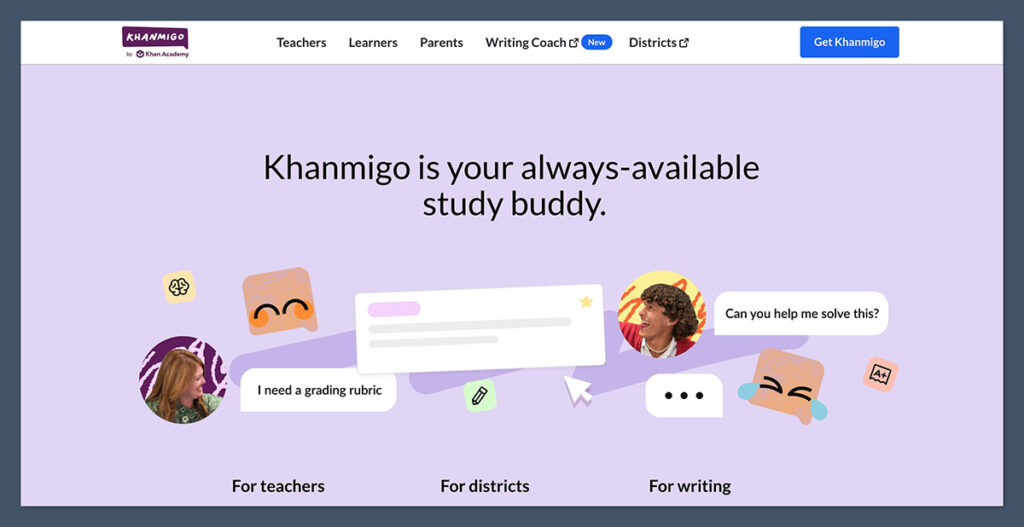
Khanmigo is developed by Khan Academy as a GPT-4-based Socratic tutor.
Instead of handing out solutions, it prompts students with guiding questions that lead to understanding. It integrates seamlessly with Khan Academy’s massive content library in math, science, humanities, and SAT prep.
Its educational philosophy puts learning before automation, making it one of the most ethical tools available today.
Pros:
- Supports deep conceptual learning
- Integrates directly with free Khan Academy courses
- Designed to reduce dependency on AI
- Affordable and accessible for teachers and families
- Transparent about data handling and use
Cons:
- Best suited for users already in the Khan ecosystem
- Limited functionality outside core Khan subjects
- May not appeal to students who want instant answers
Pricing:
- Free Access: Yes (for teachers)
- Paid Plan: $4/month for parents and learners
Verdict:
Perfect for K–12 students and early college learners who want a curriculum-aligned, ethical AI tool with strong pedagogical backing.
3. Photomath – Visual Step-by-Step Math Help
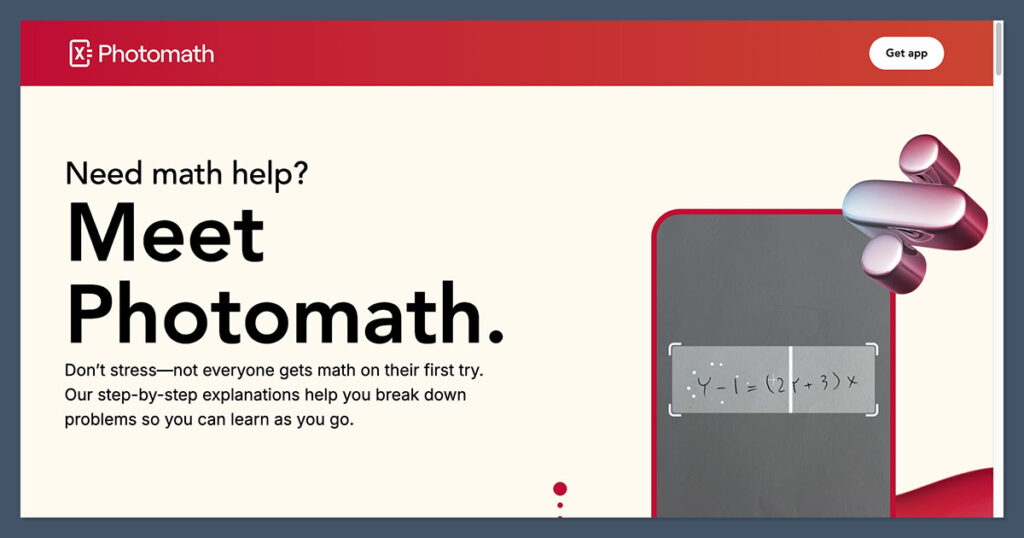
Photomath is one of the most popular tools for solving math problems using your smartphone’s camera.
It provides detailed, step-by-step solutions using animated explanations, making it ideal for visual learners who want to understand how a problem is solved—not just get the final answer.
Best for topics like algebra, calculus, and geometry.
Pros:
- Instant camera recognition of math problems
- Multiple solution paths with visual animations
- Excellent for complex equations and graphing
- Supports multiple languages
Cons:
- Focused only on math—no science, writing, or other subjects
- Advanced features locked behind paywall
- Doesn’t encourage broader conceptual understanding
Pricing:
- Free Access: Yes (core features)
- Paid Plan: $9.99/month for Photomath Plus
Verdict:
One of the fastest and most visually engaging tools for math learners. Great for immediate support but limited to quantitative subjects.
4. Brainly AI – Community-Powered AI Help
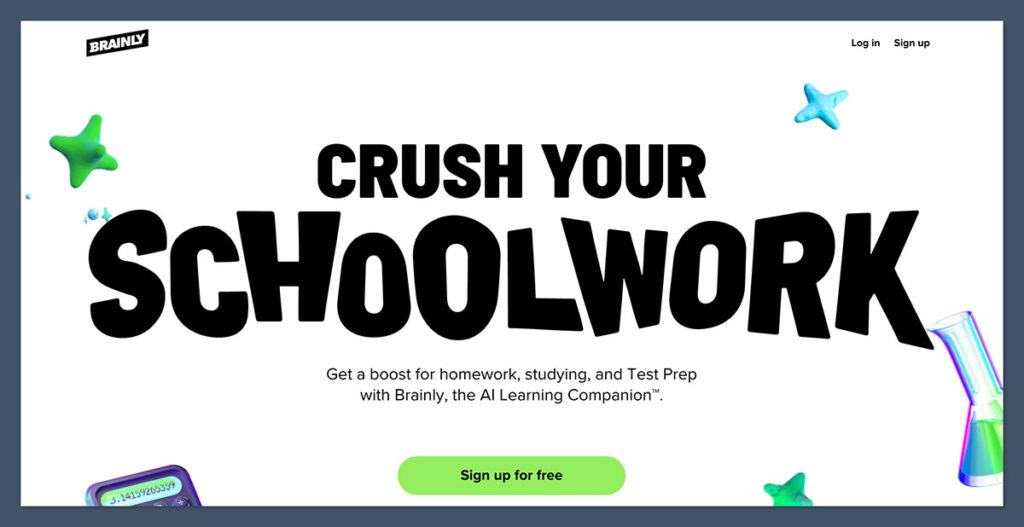
Brainly combines a human-powered Q&A community with AI tutor functionality.
Students can ask questions and receive answers from peers or use the AI assistant for quick, reliable help. Community moderation reduces incorrect or misleading answers, and expert support is available 24/7 with the premium plan.
Pros:
- Massive community with 300M+ users
- Instant AI help plus human-vetted answers
- Covers broad academic topics, including humanities
- Option to escalate to expert help
Cons:
- Ads and limitations in the free version
- Not always consistent in answer quality
- Can encourage over-reliance for last-minute help
Pricing:
- Free Access: Yes (with limitations and ads)
- Paid Plan: ~$9.99/month for Brainly Plus
Verdict:
Great for students who want peer support and a secondary layer of AI help. Its hybrid model helps filter out the inaccuracies seen in other tools.
5. Course Hero AI – Annotated Homework Helper
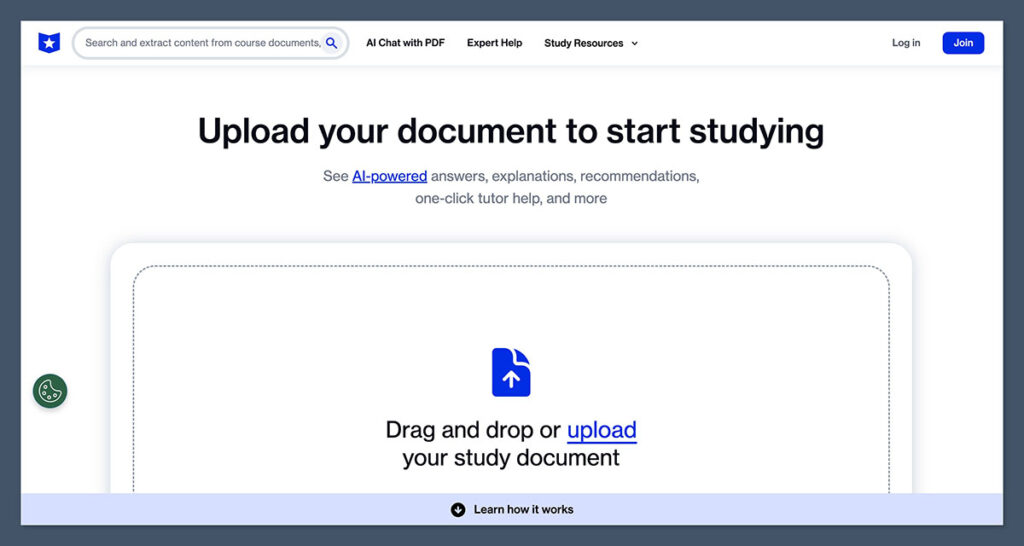
Course Hero’s AI feature automatically annotates uploaded documents like lecture slides, PDFs, or textbook pages.
It provides inline answers, explanations, and study guidance, especially useful for students in university courses dealing with detailed course packs or technical material.
It’s positioned as a high-powered study companion rather than a fast-response Q&A engine.
Pros:
- AI annotates PDFs and study materials in context
- Can escalate complex questions to human tutors
- Large content library for university-level subjects
- Particularly strong in health, engineering, and business fields
Cons:
- Price is significantly higher than other platforms
- Not ideal for casual users or K–12 students
- Limited free access
Pricing:
- Free Access: Limited document preview
- Paid Plan: $39.95/month for Premier Access
Verdict:
Ideal for deep academic work. If you’re preparing for exams or reviewing detailed class content, this tool provides powerful support—if you can justify the price.
6. Gauth – Real-Time Multi-Subject Support

Gauth (formerly Gauthmath) combines camera-based problem solving with unlimited live tutor support.
It now covers more than just math, including physics, chemistry, and economics. The instant answers make it popular with students facing urgent deadlines or complex problems.
Pros:
- Extremely fast AI responses via photo input
- Unlimited live tutor tickets in premium version
- Covers multiple STEM subjects
- Easy-to-use mobile interface
Cons:
- Occasional accuracy issues in niche subjects
- Limited feedback or step-by-step learning
- Premium features required for live tutor help
Pricing:
- Free Access: Yes (core AI solving features)
- Paid Plan: $11.99/month for Gauth Plus
Verdict:
Excellent option for quick help in STEM fields. Especially valuable when used as a supplement, not a replacement, for deeper learning.
7. Smodin Omni – AI Writing, Checking, and Homework Help
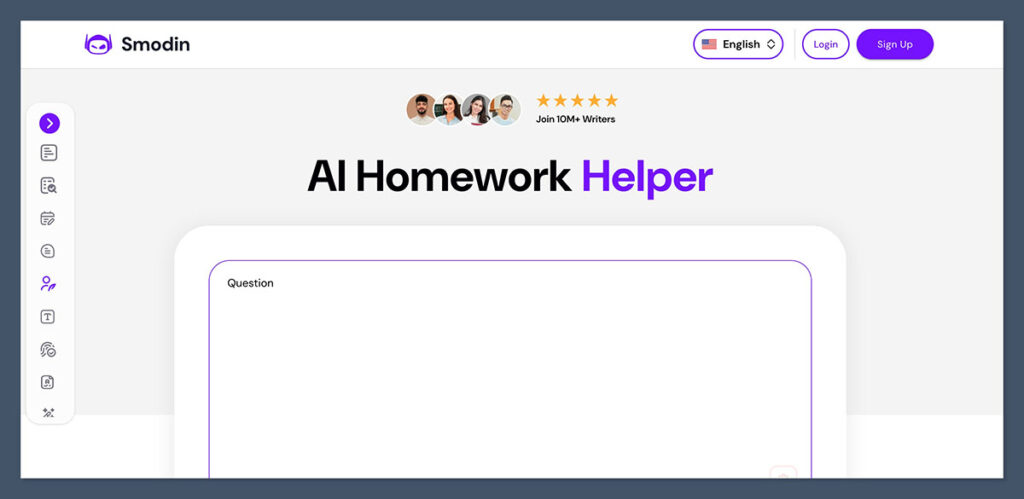
Smodin offers a powerful suite of tools in one dashboard: Q&A, writing assistant, paraphrasing, plagiarism detection, and grading.
It’s ideal for students balancing multiple assignments, particularly in writing-heavy subjects like English, history, or social science.
Pros:
- Combines several key functions in one place
- Great for essay support and editing
- Includes an AI grader and citation tools
- Reliable for deadline-focused users
Cons:
- Interface may feel cluttered with too many features
- Answers can be generic without proper input
- Requires an annual plan for best pricing
Pricing:
- Free Access: Yes (limited features)
- Paid Plan: $15/month (annual plan required for student rate)
Verdict:
Best for productivity-focused students who need writing help, paraphrasing tools, and quick grading in one place. Not ideal for conceptual tutoring.
8. Socratic by Google – Free, Search-Driven Study Aid

Socratic is a 100% free app by Google that uses your phone’s camera to scan questions and then fetches helpful explanations, web articles, and educational videos from reliable sources.
It doesn’t generate answers itself but acts more like a research guide.
Pros:
- Fully free and ad-free
- Easy-to-use interface with no login needed
- Pulls content from trusted education platforms
- Great for K–12 and early college
Cons:
- No personalized feedback or tutoring
- Doesn’t work well with complex, multi-part questions
- More of a research tool than a tutor
Pricing:
- Completely Free
Verdict:
A solid no-cost resource that helps students understand concepts by finding the right explanations online. Less interactive, but highly reliable.
9. CheggMate – Advanced Tutoring for Textbook Users
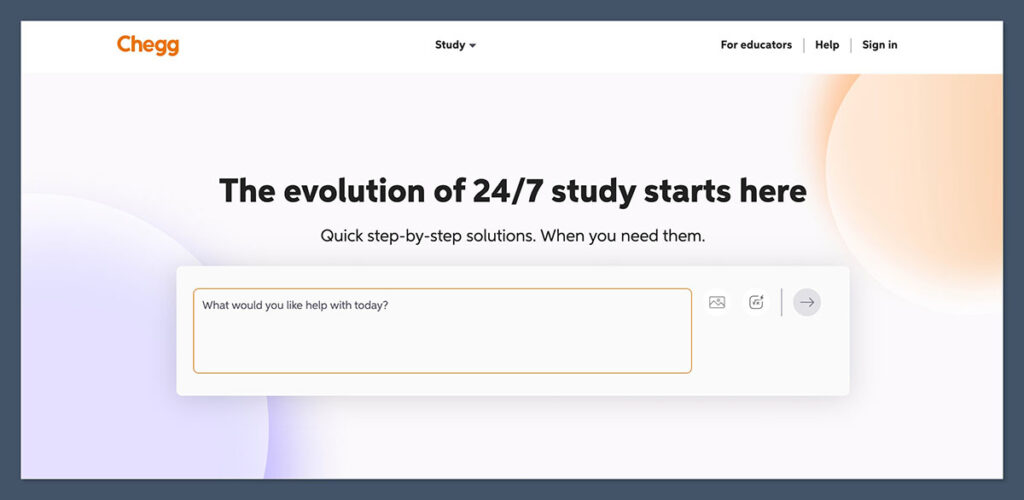
CheggMate integrates GPT-4 with Chegg’s extensive library of solved textbook problems.
It’s designed for students already familiar with Chegg’s study packs and who want a more interactive learning experience layered on top of textbook content.
Pros:
- Built on Chegg’s trusted content base
- GPT-4 enhances clarity and personalization
- Covers a wide range of university subjects
- Useful for textbook problem walkthroughs
Cons:
- No free access
- Limited adaptability outside textbook formats
- Can feel rigid compared to more flexible platforms
Pricing:
- No Free Tier
- Paid Plan: $19.95/month (as part of Chegg Study Pack)
Verdict:
An ideal add-on for existing Chegg users who want more dynamic explanations. Not recommended if you’re not already using Chegg regularly.
10. College Tools – Chrome-Based Quiz Assistant
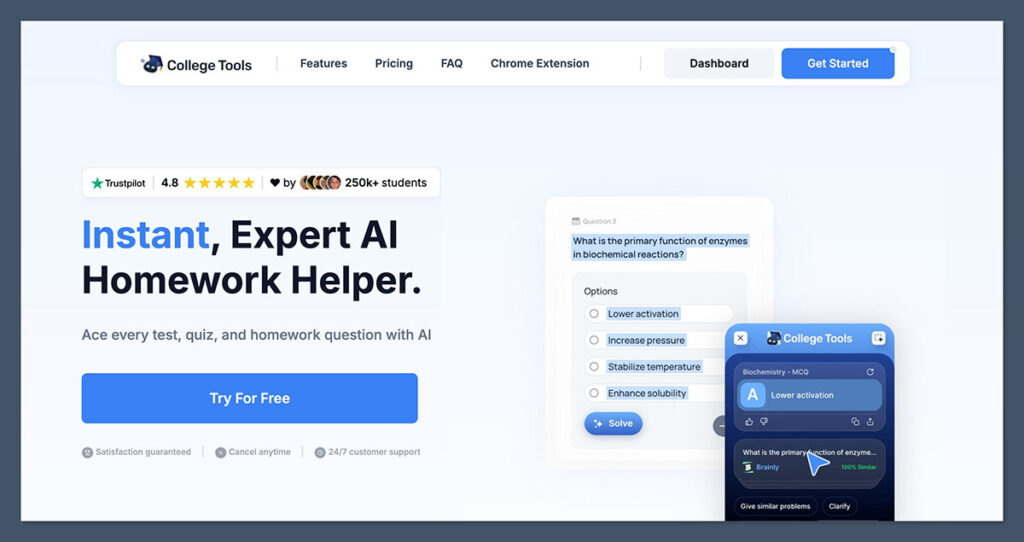
College Tools is a Chrome extension that provides real-time quiz help by embedding answers directly into online learning platforms.
It’s designed for speed and convenience, especially when taking multiple-choice quizzes on platforms like Canvas or Blackboard.
Pros:
- Seamless integration with browser-based quizzes
- Camouflage mode keeps assistance discreet
- No need to copy/paste or switch tabs
Cons:
- Limited subject depth
- Not suitable for essay writing or concept-heavy questions
- May raise academic integrity concerns if misused
Pricing:
- Free Version: Yes (limited functionality)
- Paid Plan: $9.99/month for Pro Access
Verdict:
Designed for fast quiz assistance rather than comprehensive tutoring. Helpful in the right context, but not a replacement for deeper study tools.
Which Tool Fits Your Learning Style Best?
Here’s a simple breakdown:
- Need structure and progression? AI-Tutor.ai, Khanmigo
- Visual or quick help? Photomath, Gauth, Socratic
- Want community input? Brainly, Course Hero
- Looking for writing + checking support? Smodin
- Need on-screen quiz help? College Tools
There’s no one-size-fits-all solution. Try a few and see which one genuinely supports the way you learn.
A Note on Academic Integrity
No matter which platform you use, the goal should be learning—not just shortcuts. Use these tools to clarify, to explore, to review—not to avoid doing the work.
Misusing AI for assignments can violate academic honour codes and damage your understanding long term.
Where AI Tutoring Is Headed Next
Keep an eye on emerging features like:
- Multimodal learning (text + voice + video)
- Local, privacy-preserving AI models
- Peer-to-peer mentorship marketplaces
- Emotionally intelligent AI tutors
These innovations aim to blend efficiency with empathy—something the best tools are already starting to embrace.
Final Thoughts
AI can make learning easier, faster, and even more enjoyable—but only if the platform is aligned with how you actually learn.
The best alternatives to Answers.ai don’t just give you a result; they support your growth, reduce stress, and help you stay curious.
Pick one or two tools that seem to match your study habits and test them over the next week. The right tool should make your workload lighter—not your understanding shallower.

Comments 0 Responses